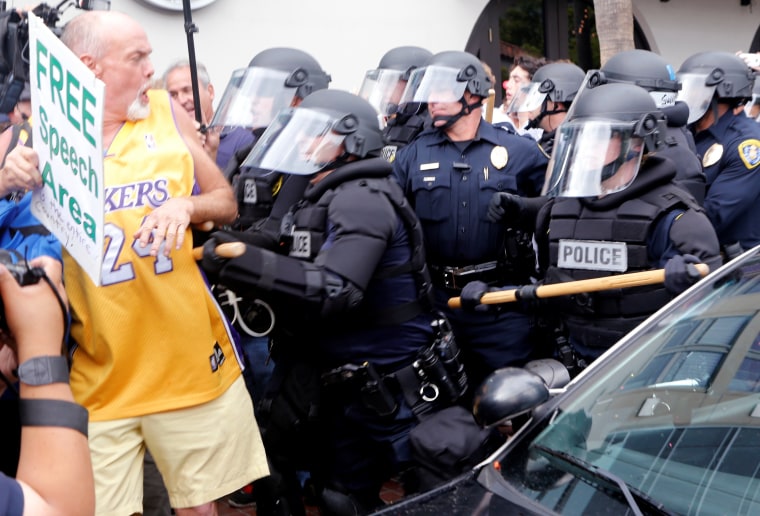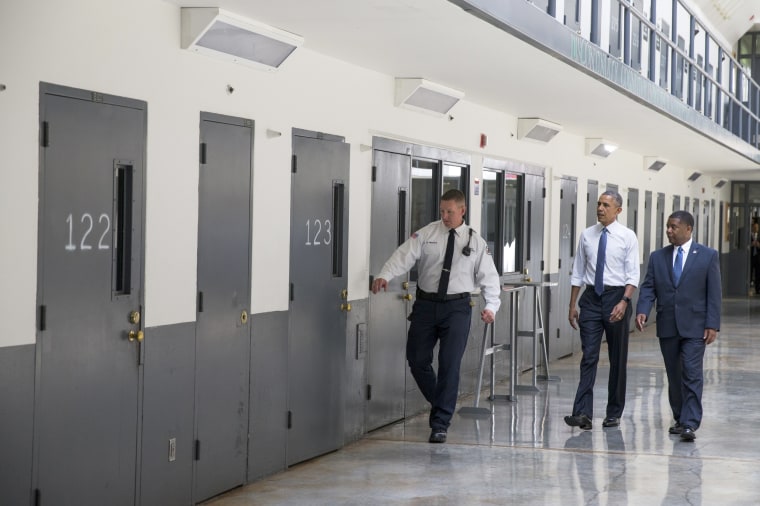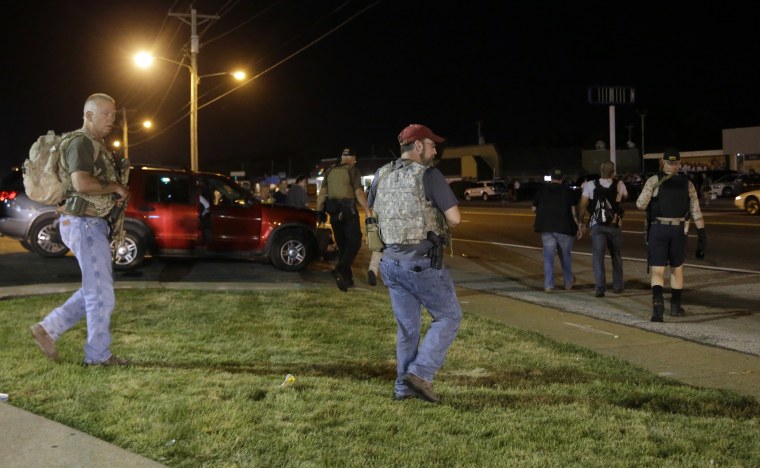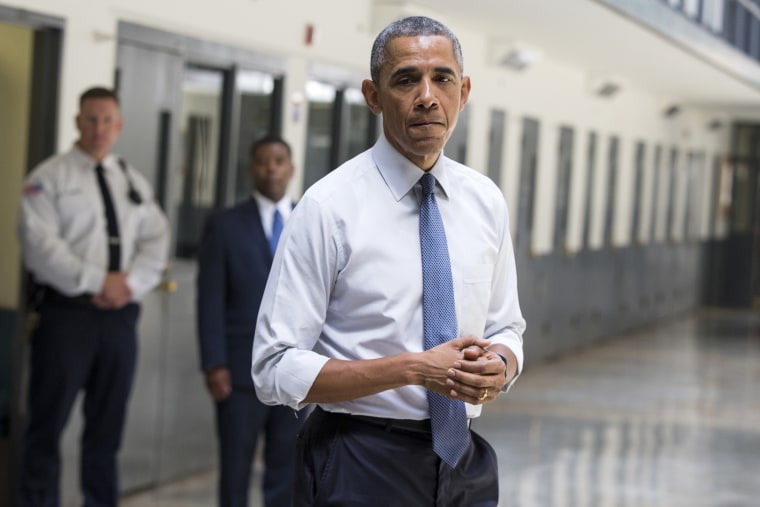Bipartisan enthusiasm for efforts to reform America's criminal justice system has waned —stalling not only a bill President Obama is advocating, but halting movement on an issue the president considers part of his legacy.
“There were some promising signs two years ago, and some of the thrill is gone," said David Dagan, a political scientist at John Hopkins University in Baltimore who has extensively studied criminal justice reform efforts.
A U.S. Senate bill that would reduce mandatory minimum sentences for some drug crimes is drawing increasing resistance from conservative Republicans, even as Obama and some in the GOP push for it.
Provisions at the state level to help people who were previously incarcerated, such as restoring their voting rights, are also drawing conservative opposition.
And efforts to reform police practices, which gained traction in the wake of the controversies in Ferguson, Missouri, are facing a backlash from conservatives like Donald Trump but also more non-partisan figures, such as New York Police Commissioner William Bratton.
Two years ago, there was bipartisan enthusiasm around criminal justice reform.
Figures like Kentucky Sen. Rand Paul, a conservative Republican, were calling for the restoration of voting rights for felons.
Watch: Bipartisan Push For Criminal Justice Reform
Members of both parties were arguing that local police departments should not have the kind of military-style equipment that was deployed in Ferguson.
Criminal justice reform seemed like the one piece of legislation that Obama and congressional Republicans could agree to.
Related: Obama Building Groundwork of Criminal Justice Reform Legacy
But the rise of Trump, backlash to Black Lives Matter and an increase in murders in some major cities have combined to create a tense, complicated debate over policing and race that could impact President Obama’s final months in office, the presidential election and key congressional races.

"As the reform enthusiasm turned into concrete policy proposals, people realized it’s very hard to reform the prison system in a way that people can be very confident also enhances public safety,” Dagan said, author of the new book "Prison Break: Why Conservatives Turned Against Mass Incarceration."
“The other thing,” he added, “is that the opponents came out of the woodwork.”
Criminal Justice Reform's Uncertain Fate
The criminal justice reform bill that Congress is considering would end the provision that imposes life prison sentences for some people convicted of three drug crimes, make it easier for judges to reduce sentences for drug crimes and soften mandatory minimums for some other crimes.
If it passes, criminal justice legislation could be one of the last major legislative achievements of Obama’s presidency.
Related: Obama Visits Prison in Push for Reform
One of his top advisers, Valerie Jarrett, has been working on the issue for months, and White House Press Secretary Josh Earnest said recently that the administration is “cautiously optimistic” about legislation passing.
The bill was approved in the Senate Judiciary Committee in October, with the backing of conservatives like Utah Sen. Mike Lee and Texas Sen. John Cornyn.

But Senate Majority Leader Mitch McConnell has not announced support for the legislation or promised it will come to the floor for a Senate vote this year. And while House Speaker Paul Ryan has personally suggested he supports criminal justice reform, it’s not clear the majority of House Republicans do.
And now influential Republicans are aggressively opposing the legislation, such as Alabama Sen. Jeff Sessions, who is a close ally of Trump.
Tom Cotton, the conservative U.S. senator from Arkansas, argued in a recent speech that efforts to limit sentences for non-violent drug offenders, reduce the number of Americans in jail and restore voting rights to felons are misguided. Cotton, noting that the perpetrator in most crimes is never caught, said America has an “under-incarceration problem,” not the mass incarceration that many liberals complain of.
“The ill-considered policies of criminal-leniency advocates and the resulting increases in crime reflect a badly misguided mindset. Criminals are not victims. Criminals are criminals. Victims are victims,” Cotton said.
Getting additional Republican support for criminal justice reform could be more complicated if it is portrayed as part of the agenda of liberal activists who are wary of police overreach.
“Most of the Republicans do support the bill. But some of the most vocal are opposing it, and they have been able to persuade people,” said Inimai Chettiar, director of the “Justice Program” at the Brennan Center for Justice, a non-profit organization.
Police Reform Has A Number of Different Opponents
The push from activists, particularly Black Lives Matter, to take away military equipment from police departments, end so-called broken windows style-policing and change union rules that often protect officers were always going to be challenging.
Related: Obama: U.S. Cracking Down on 'Militarization' of Local Police
“The trans-partisan coalition for sentencing reform, even as it spread to purple states and the federal level, never spread to policing reform,” said Heather Hurlburt, a scholar at a non-partisan think tank called New America. Hurlburt studies how some policy initiatives are able to get bipartisan support.
But a series of new factors have also emerged, complicated efforts to change policing practices.
Police officers and their conduct have become a partisan issue, with ideological divides that in some ways mirror the rest of American politics.
Trump has argued that the police are being unfairly stigmatized by Black Lives Matter and other activist groups. Trump, at his overwhelmingly-white rallies, regularly praises the police.
And other Republicans are joining him in this argument. U.S. Sen. Pat Toomey, a Republican running for reelection in Pennsylvania in a closely-watched race, has made “supporting law enforcement” one of the top issues in his campaign.
In contrast, some of the mothers of young black people who have been killed by the police in controversial incidents having been campaigning for Hillary Clinton.
“There is no question that Black Lives Matter has engendered a backlash on the issue of police reform,” Dagan said.
To be sure, some changes have occurred. A growing number of police departments are having their officers wear body cameras. Police chiefs in Chicago and San Francisco stepped down after controversial shootings of civilians by officers.
Rise in Murder Rates in Large Cities
The other significant factor that could complicate criminal justice reform is a rise in the murder rate in some big cities.
In a study of crime data from 2015, Brennan Center found that the murder rate overall remains much lower than in the 1980’s, but that Baltimore and Washington, D.C. in particular had sharp rises in killings last year.
James Comey, the FBI director who was appointed by Obama but is a Republican, is increasingly highlighting rising rates of homicides.
Comey has attributed that rise in part to police officers in these areas being more cautious because they are wary of being filmed and then becoming the subject of a protest by Black Lives Matter.
Related: 'Ferguson Effect' Might Cut Needless Arrests, Baltimore Study Finds
Obama aides and Attorney General Loretta Lynch have repeatedly said they do not agree with Comey’s analysis. But the FBI director has continued to make the argument.
"I’ve heard it from the folks who briefed me. I’ve heard it lots in conversations, privately, with police leaders," said Comey. "That they perceive lots of places in the country, a change in the way police are doing their work."

In a recent interview on the New York-based “Brian Lehrer Show," Bratton, the New York City police chief, criticized what he called “intimidation tactics” of “unruly people with cameras.” Bratton said he agreed with Comey’s remarks about officers being wary of doing their jobs with cameras potentially capturing any kind of conflict, citing a 2015 survey of officers on NYC’s force that found evidence of police “pulling back.”
“The attacks of the last two years on the American criminal justice system hasn’t been just on the police, which has been the usual history,” said Bratton. “The attacks have been really broad-based, on the whole American system of criminal justice.”
He added, “Grand juries, judges are being attacked, not physically, courts, district attorneys, police, there has not been in the modern history in America such a full-frontal attack on all elements of the criminal justice system.”
Steps to Help Ex-Convicts Have Met Some Resistance
The Obama administration is taking a number of steps to make life easier for people after they leave prison.
Obama aides have urged companies to "ban the box," meaning that they don't ask job applicants early in the process if they have any prior criminal convictions. The administration is now trying to encourage colleges not to consider heavily criminal records during the application process.
Related: HUD Seeks to End Housing Discrimination Against Ex-Offenders
In Virginia, Gov. Terry McAuliffe, a Democrat, recently took an executive action to restore the voting rights to an estimated 206,000 felons who have served their sentences. But the Republicans in the state's legislature then filed suit to stop the move.
“Legalize prohibited activity, reduce prison sentences, close prisons, restrain the police, and swiftly restore all rights and privileges of citizenship upon release from prison. Sound familiar? This kind of thinking created the crime waves” of the 1980’s and early 1990’s, Cotton said.
On Friday, the White House announced that Obama was commuting the sentences of 42 people, many of whom were convicted of drug crimes. But the administration admitted that it had limited power on criminal justice issues without broader congressional action.
"There remain thousands of men and women in federal prison serving sentences longer than necessary, often due to overly harsh mandatory minimum sentences," wrote White House Counsel Neil Eggleston, in a statement. "That is one reason it is critical that both the House and the Senate continue to cooperate on a bipartisan basis to get a criminal justice reform bill to the President's desk."
